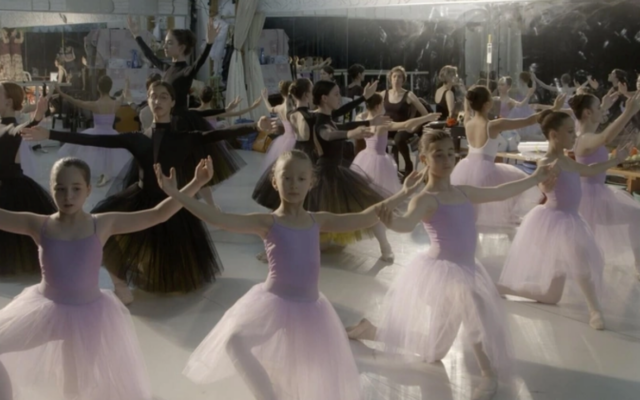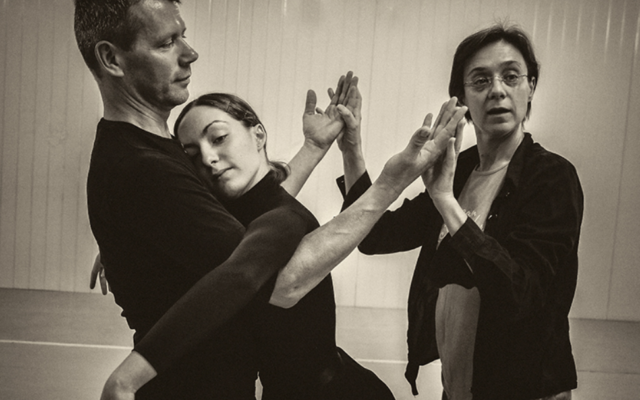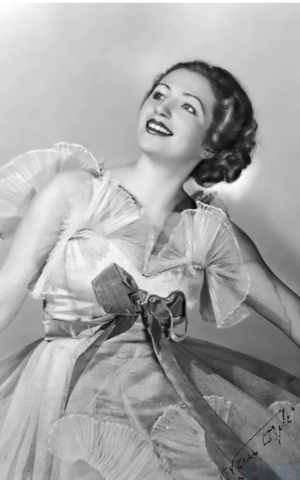Jerusalem Ballet Needs Support to Perform in Atlanta
“Momento,” about the life and tragic death of a young ballet star, has been part of the Jerusalem Ballet’s repertoire for the last four years.

The founder of the Jerusalem Ballet Company, Nadya Timofayeva, visited Atlanta last month to drum up support for an American tour for her company. During a short stay that was coordinated by the Israel Consulate in Atlanta, she visited dance programs in Peachtree City, Atlanta, and at Kennesaw State University.
In meetings with local cultural leaders, she was particularly interested in promoting the Jerusalem’s Ballet production of “Momento, Franceska’s Last Dance At Auschwitz,” a performance set during the Holocaust in the fall of 1943. It first premiered in September 2019 on the 80th anniversary of the start of World War II in Europe.
The story is based on the life of a young, rising ballet star, Franceska Mann, who, before the war, had won a prestigious international dance competition in Europe. Her career was cut short when the Germans invaded Poland in 1939 and she was interned in the Warsaw Ghetto. But despite the extraordinary difficulties of daily life in the ghetto, she remained stubbornly optimistic.
“She never gave up hope,” Timofayeva said, “that the world would do what was right and she could resume her life. To the very end she was hopeful.”

The Jerusalem Ballet performance is based on research Timofayeva conducted at Yad Vashem, Israel’s Holocaust Museum, and among family members of Mann, who had survived the war and told of her heroism.
Mann was among a group of young women who were transported from the ghetto under the false assumption that they were to be ransomed from German prisoners of war being held in Switzerland.
The actual story, according to accounts in the book, “Eyewitness Auschwitz,” by Filip Mueller and confirmed by testimony at the International Military Tribune in Nuremberg, at the end of World War II was that their real destination was the gas chambers at Auschwitz. It was while there, just before her death, that Mann either used a pistol she had hidden in her clothes, or she wrestled away a weapon from one of the SS guards. Moments later she murdered one of the officers who was supervising the women and wounded another Nazi soldier. In her staging of the story’s climactic moment, the Jerusalem Ballet director choreographed the dance of death without the use of weapons. Instead, in her final moments on stage she wraps her body around the Nazi solider and crushes him.

When she first heard the story, Timofayeva recalls that she could imagine Mann’s journey of hope and disappointment and finally, death, as a great performance.
“I could see myself as this woman, I could see myself move as she moved. As I worked on the dance for nearly a year, her feet seemed to become my feet. Her story became a part of me.”
Timofayeva’s own story is also an interesting one. Nadya grew up in the former Soviet Union, where she graduated from the world-famous Bolshoi Ballet School and became a member of the company.
Her mother, Nina Timofeeva, as she was known in Russia, was a prima ballerina, who starred at both the famed Mariinsky Ballet in St. Petersburg and the Bolshoi in Moscow, where she was featured in some of the greatest works of the Russian classical ballet. Her fame was confirmed when she was later elected for a four-year term to the Supreme Soviet, the legislative body of the Soviet Union. The family immigrated to Israel in 1991. Nadya established the Jerusalem Ballet in 2008, six years before her mother’s death.
Nadya admits it has been a struggle to get Israeli audiences to accept classical dance as she knew it in Russia. Although her company is supported by the Israel Ministry of Culture and the Jerusalem municipality’s cultural department, she has had to adapt her approach to performance.
The choreography of works like “Momento” is what she describes as “neoclassical.” It joins a repertoire that, in recent years, has included dance performances of Shakespeare’s “Taming of the Shrew” and “Fiddler On The Roof.”
A documentary film about the evolution of “Momento” is now in production in Israel. It is being put together by the same company that produced “Underground Ballet,” about the Jerusalem Ballet that won best documentary at the Haifa International Film Festival. The film follows the company through its rehearsals in a space that they have rented for several years under the bleachers at Jerusalem’s main soccer stadium. It was a featured selection at the Atlanta Jewish Film Festival in 2020.
“Maybe when the new documentary about ‘Momento’ is finished,” Timofayeva said, “we can come to the Jewish film festival in Atlanta to perform our ballet in person.”
- Arts and Culture
- Local
- Bob Bahr
- Jerusalem Ballet Company
- Nadya Timofayeva
- Israel Consulate
- Kennesaw State University
- Momento
- Franceska’s Last Dance At Auschwitz
- holocaust
- Franceska Mann
- warsaw
- Yad Vashem
- Eyewitness Auschwitz
- International Military Tribune
- Nuremberg
- Filip Mueller
- Mariinsky Ballet
- St. Petersburg
- Bolshoi
- Supreme Soviet
- Israel Ministry of Culture
- Shakespeare
- Taming of the Shrew
- Fiddler on the Roof
- Haifa International Film Festival
- Atlanta Jewish Film Festival



comments